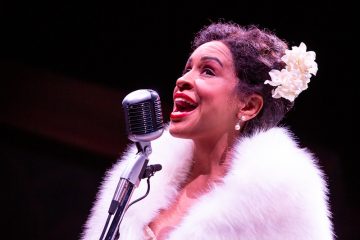Revisiting ‘Lady Day’
Candice Handy, associate artistic director of Cincinnati Shakespeare Company, discusses her production of Lanie Robertson’s Lady Day at Emerson’s Bar and Grill at Merrimack Repertory Theatre, and reveals how she first connected to the material and how the play lands differently now. Candice shares her background as both an actor and musician; Billie Holiday’s connection to Lowell; how actors are doctors to the soul; the wonder of discovering things you didn’t know you knew; the danger of silencing artists; the value of art in troubled times; and the importance of giving a play the grit it requires to deliver the transcendence it deserves. (Length 24:05)
Podcast: Download (Duration: 24:05 — 27.6MB)
